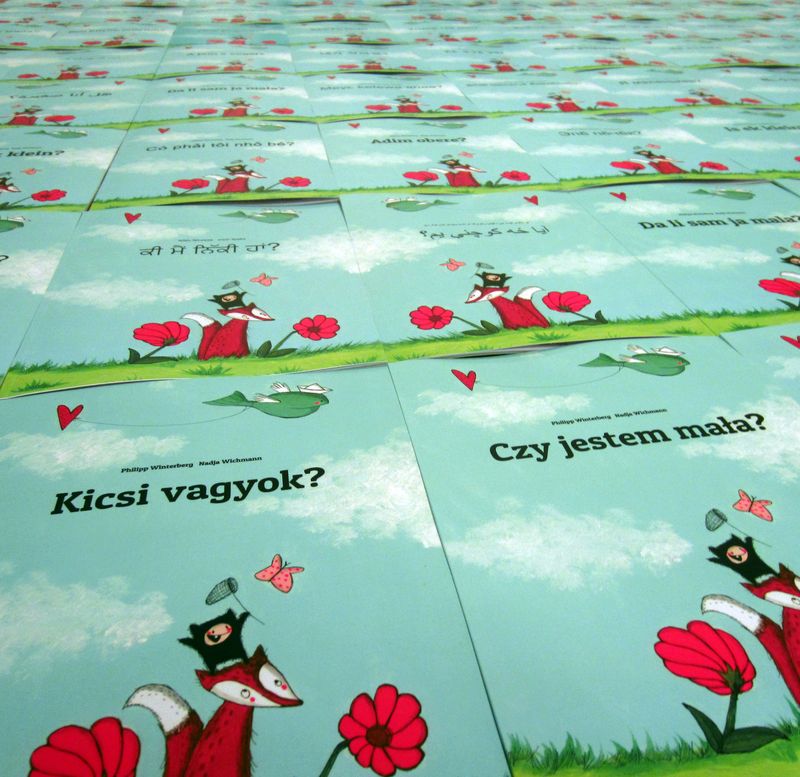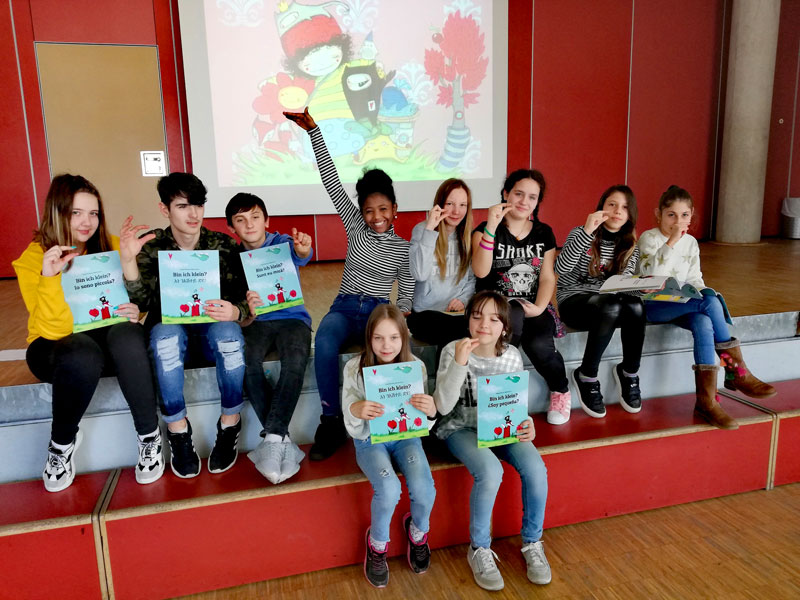
A World Children’s Book for Every Country on the Planet
From Aramaic to Zulu: The picture book Am I small? has been translated into over 200 languages and dialects since its publication.
The story by author Philipp Winterberg is available for every country in the world in at least one national language. It is the world's first children's book covering the entire globe.
In Am I small? young and old readers alike accompany the girl Tamia on a journey full of wonders. Together they discover that size is relative and that Tamia is just right the way she is. "Enchanting" judges the trade journal Eselsohr; "wonderful for bilingual families, and kindergartens," says the Börsenblatt and the book review magazine Kirkus Reviews kindly compliments "for children who enjoy lingering over pages full of magical creatures and whimsical details [...] told in simple and engaging words and imaginative pictures."
More than 500 translators have already participated in the World Children's Book. Sometimes the research took months, "I had to look for a Tibetan translator for almost a year," says Winterberg. The book is now also available in thousands of language combinations, such as Arabic-Tagalog or Portuguese-Tigrinya — a language spoken in Ethiopia and Eritrea, whose script is reminiscent of children's drawings.
In the years and decades to come the World Children's Book project will continue to grow. The aim is to gradually translate Am I small? into over 500 different languages and dialects.
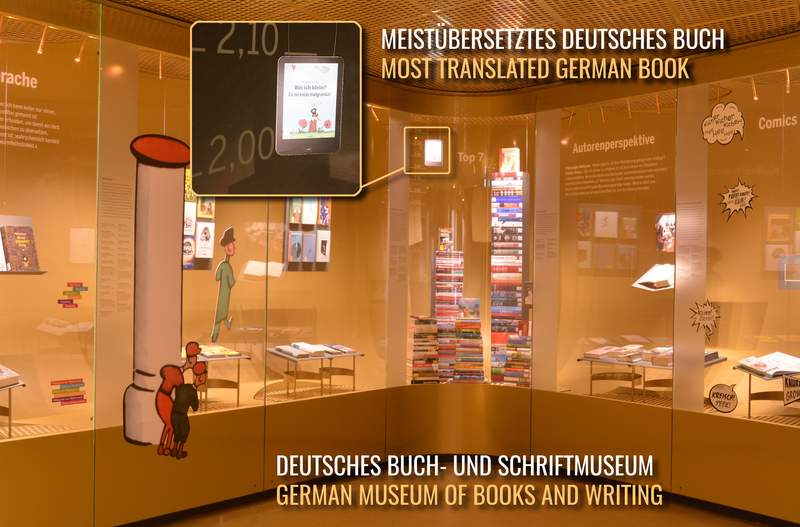
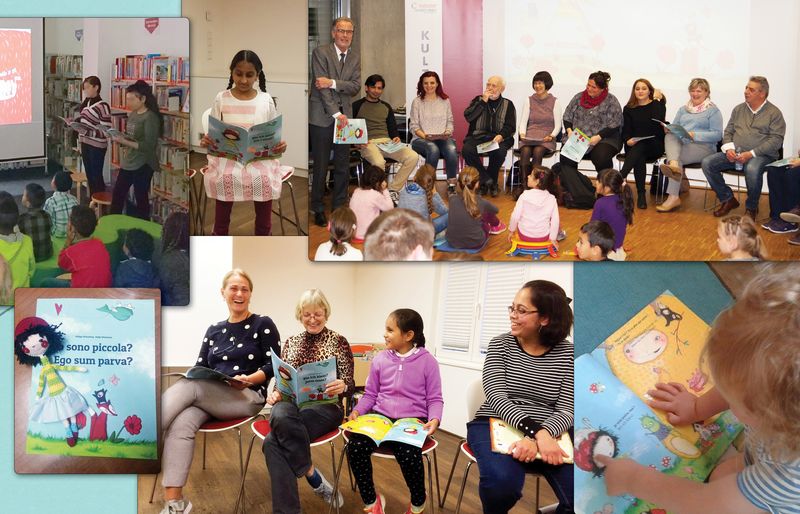
"This is baby’s favorite book!" —Feedback from the United States
"The text and illustrations [...] expand your view of the world." -- El País, daily newspaper in Spain
"for children who enjoy lingering over pages full of magical creatures and whimsical details [...] told in simple and engaging words and imaginative pictures.”—Kirkus Reviews
"This has been my daughter’s favourite book since she was 4 months old. The sentences are nice and short so she doesn’t lose interest in the pictures while I’m reading each page." —Feedback from the UK
"You are small or big depending on with what you relate to. A simple cute book which exactly portrays this message." —Feedback from India
"We are in love with this book! [...] I highly recommend this book"—Feedback from the United States
"My three year olds love it and the story’s concept will grow with them for several years to come making it a keeper."—Feedback from the U.S.
"I got this book to read with my granddaughters, one from the US and one from Portugal. It is so incredibly cute! They loved it, and I did too. I highly recommend this book!" —Feedback from the U.S.
"My little boy loves this as a bedtime story. It’s colourful and quirky. [...] I thought it would be uninteresting to a child, to be read to in another language, but he asks for ’Bin ich klein’ and it melts my heart!"—Feedback from the United Kingdom
"I LOVED it. Lots of repetition to help ’lil ones get used to structure and words! [...] Most importantly, it sends a good message about how being unique and different is good."—ESL Carissa Blog
"This is done with simplicity at its finest. The art is whimsical, the message is clear and most of all my grandson loves it. I would recommend this book to any child provider as part of their reading library."—Feedback from the U.S.
"I got this book when my daughter was 3 years old. I used to read it for her in English and Arabic. Now, she’s 6 and still loves this book."—Feedback from the United States
"[...] readers will emerge from this book feeling slightly more confident about themselves—whatever their size."—ForeWord Clarion Reviews
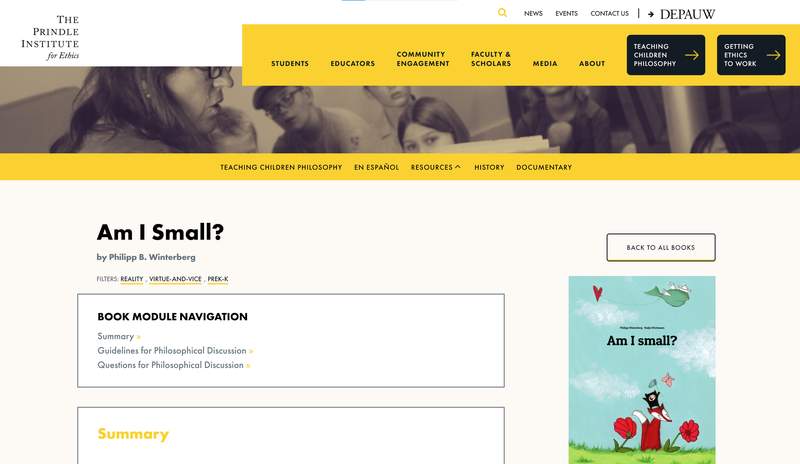
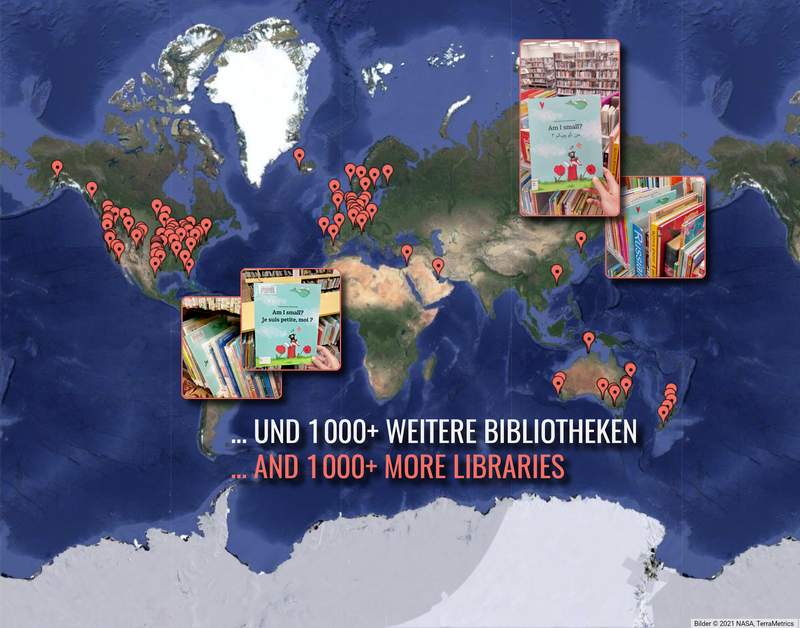
1 000+ libraries
200+ languages and dialects
📖 Сара схәыҷума? (Abkhaz / Abxaz / Abkhazian)
📖 Meyɛ ketewa anaa? (Akan / Twi / Asante)
📖 我细汉系? (Chinese / Min Chinese / Amoy Dialect)
📖 Amʊn naa saa gʊŋɛ aà? (Anii / Gisida / Bassila / Baseca / Akpe)
📖 هو انا صغيرة؟ (Egyptian Arabic / Masri)
📖 هل أنا صغيرة؟ (Gulf Arabic / el-lahja el-Khalijiyya)
📖 هل أنا صغيرة؟ (Levantine Arabic)
📖 واش أنا صغيرة؟ (Maghrebi Arabic / Moroccan Dialect / Darija)
📖 انا زشعتا؟ (Aramaic / Eastern Aramaic / Mandaic)
📖 Дун гьитlинайищ? (Avar / Avaric)
📖 ¿Jisk’asktti? (Aymara / Central Aymara)
📖 Mən balacayam? (Azerbaijani)
📖 Awak tyang cenik nggih? (Balinese / Bali)
📖 Wala ne ka dɔgɔ wa? (Bambara)
📖 Bin i kloa? (Bavarian / Austro-Bavarian)
📖 Ці я маленькая? (Belarusian)
📖 Sadit ba ako? (Bicolano / Bikol / Coastal Bikol / Bikol Naga)
📖 Mi mi smol? (Bislama / Bichelamar)
📖 Ha gwir eo on bihan ? (Breton)
📖 ငါက သေးငယ်လား? (Burmese / Myanmar)
📖 我個子小嗎? (Cantonese / Yue Chinese)
📖 Ami e pikinoti? (Cape Verdean Creole)
📖 Ndine mwana? (Chewa / Chichewa / Nyanja)
📖 我小吗? (Chinese / Mandarin Chinese [Simplified])
📖 我細小嗎? (Chinese / Mandarin Chinese [Traditional])
📖 Eiu socu chjuca ? (Corsican)
📖 Jesam li ja mala? (Croatian)
📖 آیا من کوچک هستم؟ (Dari / Afghan Persian / Farsi)
📖 އަހަރެން ކުޑަތަ؟ (Dhivehi / Maldivian)
📖 Kuɔɔr ë ɣɛɛn? (Dinka / South Dinka)
📖 Ĉu mi estas malgranda? (Esperanto)
📖 Kas ma olen väike? (Estonian)
📖 Ako ba ay maliit? (Filipino / Tagalog)
📖 Olenko minä pieni? (Finnish)
📖 Je suis petite, moi ? (French)
📖 Bihidefin ihidefich kleiheidefein? (Secret Language / German Chicken Language (Hühnersprache))
📖 Bilewin ilewich kleilewein? (Secret Language / German Spoon Language (Löffelsprache))
📖 I uarereke ngai? (Gilbertese / Kiribati)
📖 Chemichĩ piko che? (Guarani / Paraguayan Guarani)
📖 શું હું નાની છું? (Gujarati)
📖 Eske mwen piti? (Haitian Creole)
📖 Owami omuṱiṱi po? (Herero / Otjiherero)
📖 Ka gamay sa akon? (Hiligaynon)
📖 Lau be maraki a? (Hiri Motu / Police Motu / Pidgin Motu)
📖 Ammuk-za kappish? (Hittite / Nesite)
📖 Bassit ak kadi? (Ilocano / Ilokano)
📖 Apakah aku kecil? (Indonesian)
📖 An bhfuil mé beag? (Irish Gaelic)
📖 Mi likkle? (Jamaican Patois / Jamaican Creole)
📖 Мен кішкентаймын ба? (Kazakh)
📖 ¿In nitz’ na? (K’iche’ / Quiché)
📖 Mukele fioti? (Kongo / Kikongo)
📖 Ez biçûk im? (Kurdish / Northern Kurdish / Kurmanji)
📖 من بچووکم؟ (Kurdish / Central Kurdish / Sorani)
📖 Мен кичинекейминби? (Kyrgyz)
📖 ڪيا مئين ننڍڙي هان؟ (Southern Lahnda / Siraiki / Seraiki / Saraiki)
📖 Bünn ick lüdderk? (Low German / Emslandic)
📖 Ne katshutshu? (Luba-Katanga / Luba-Shaba / Kiluba)
📖 Ndi mutono? (Luganda / Ganda)
📖 Sinn ech kleng? (Luxembourgish)
📖 की हम छोट छी? (Maithili / Bihari)
📖 Би бяцхан гэж үү? (Mongolian)
📖 Da li sam ja mala? (Montenegrin)
📖 Oning nga duwo? (Nauruan / Nauru)
📖 Ban ik latj? (North Frisian)
📖 Toho do ahu geleng? (Northern Batak / Pak-Pak Dairi)
📖 Ngimncane na? (Northern Ndebele / Zimbabwean Ndebele)
📖 Na ke o monyenyane? (Northern Sotho / Sepedi / Pedi)
📖 Er eg hjokk? (Nynorn / Norn)
📖 Ngame omushona? (Oshiwambo / Oshindonga Dialect)
📖 Æццæй, æз чысыл дæн? (Ossetian / Ossete / Ossetic)
📖 Mi ta chikitu? (Papiamento / Papiamentu)
📖 آیا زه کوچنې یم؟ (Pashto / Pukhto)
📖 Bin ich glee? (Pennsylvania Dutch / Pennsylvania German)
📖 من کوچیکم؟ (Persian / Farsi)
📖 Sou pequena? (Brazilian Portuguese)
📖 Serei eu pequena? (Portuguese (Portugal))
📖 Asma līkuta? (Prussian / Baltic Prussian)
📖 ¿Uchuy kanichu? (Quechua / Southern Quechua / Cusco Dialect)
📖 काँई मैं छोटी हूं? (Rajasthani / Shekhawati Dialect)
📖 Sun jau pitschna? (Romansh / Romansch)
📖 Mbi yéké kété? (Sango / Sangho)
📖 So pidda? (Sardinian / Sard)
📖 Um A wee? (Scots / Lowland Scots)
📖 A bheil mi beag? (Scottish Gaelic)
📖 A ke monnye? (Setswana / Tswana)
📖 Mon pti mwan? (Seychellois Creole / Kreol seselwa)
📖 我很小吗? (Shanghainese / Hu / Wu Chinese)
📖 Sugnu nica iu? (Sicilian / Calabro-Sicilian)
📖 ڇا آئون ننڍي آهيان؟ (Sindhi)
📖 මම පොඩි ද? (Sinhala / Sinhalese)
📖 Ali sem majhna? (Slovenian / Slovene)
📖 Ngimncinyane yini? (Ndebele / Southern Ndebele / Transvaal Ndebele)
📖 Na ke monyane? (Sesotho [Lesotho] / Southern Sotho)
📖 Na ke monyane? (Sesotho [South Africa] / Southern Sotho)
📖 Gou iq lwi? (Zhuang / Standard Zhuang)
📖 Ngimncane? (Swazi / Swati / siSwati)
📖 Bin ich chlii? (Swiss German)
📖 Mea naʻinaʻi au? (Tahitian / Reo Tahiti)
📖 我個頭小嗎? (Taiwanese / Taiwanese Mandarin / Guoyu)
📖 Nec ṭṭamezyant? (Tamazight / Standard Moroccan Berber / Amazigh)
📖 நான் சிறியவளாக இருக்கிறேனா? (Tamil)
📖 నేను చిన్నగా ఉన్నానా? (Telugu)
📖 Ha’u ki’ik ka lae? (Tetum / Tetun Dili)
📖 ང་ཆུང་ཆུང་རེད་འདུག་གམ། (Tibetan)
📖 Mi liklik? (Tok Pisin / New Guinea Pidgin)
📖 U ri ndzi ntsanana? (Tsonga)
📖 Au e foliki? (Tuvaluan / Tuvalu)
📖 Sym ja małka? (Upper Sorbian)
📖 مەن كىچىكمۇ؟ (Uyghur / Uighur)
About the Author
Philipp B. Winterberg M.A. studied Communication Science, Psychology and Law. He lives in Berlin and loves being multifaceted: He went parachuting in Namibia, meditated in Thailand, and swam with sharks and stingrays in Fiji and Polynesia.
Philipp Winterberg's books introduce new perspectives on essential themes like friendship, mindfulness and happiness. They are read in languages and countries all over the globe. Read more...
